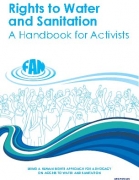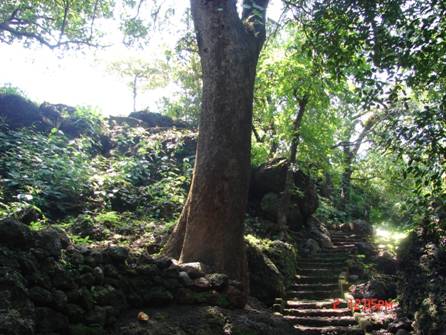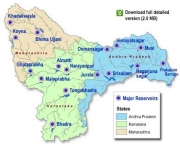/topics/public-infrastructure-and-services
Public Infrastructure and Services
Right to water and sanitation - A handbook for activists by Freshwater Action Network (FAN) Global
Posted on 31 Jan, 2011 10:11 PM With tihs, they can improve water and sanitation service regulation and provision at international, national and local levels. Directed primarily at community groups, human rights NGOs, rights-based development practitioners and aid workers, this handbook aims to strengthen human rights-based advocacy by providing innovative and practical suggestions that activists and organisations can use in their work. It also acts as a resource guide for finding further information.
With tihs, they can improve water and sanitation service regulation and provision at international, national and local levels. Directed primarily at community groups, human rights NGOs, rights-based development practitioners and aid workers, this handbook aims to strengthen human rights-based advocacy by providing innovative and practical suggestions that activists and organisations can use in their work. It also acts as a resource guide for finding further information.
Water and sanitation are essential for living a healthy life with dignity. However, around a billion people across the world lack access to a safe and sufficient water supply to cover their basic needs. Over 2.5 billion people lack access to adequate sanitation and nearly 1.2 billion face the indignity of open defecation every day.
The Millennium Development Goal (MDG) target to halve the proportion of people without sustainable access to safe drinking water and basic sanitation by 2015 is seriously off track, with sanitation severely lagging behind. For example, estimates suggest that at current rates of progress, sub-Saharan Africa will miss the MDG water target by about 25 years, while the sanitation target may not be reached until well into the 22nd century.
Irrigation tanks and their traditional local management - A remarakable ancient history of India - Paper presented at the National Seminar on Water and Culture (2007)
Posted on 31 Jan, 2011 03:20 AMTanks are rainwater harvesting techniques which capture water during monsoons for later use. Mention of tanks in colonial texts is made and the authors infer from ancient texts like Tamil Purananuru on the importance of tanks and the locations for their construction, as well detailing their geographical spread.
Traditional water management practices and water sector reforms in South India - A comparative analysis of three systems and Participatory Irrigation Management policy - Paper presented at the National Seminar on Water and Culture (2007)
Posted on 30 Jan, 2011 06:13 PMThe authors study three tanks; one each in Karnataka, Andhra Pradesh and Kerala and find that almost all tanks in Southern India face similar problems that include farmers in command area being deprived of water, siltation, lack of proper maintenance of such structures, lack of political will to decentralise authority to tank institutions etc.
Preservation of Mysore urban water bodies - Paper presented at the National Seminar on Water and Culture (2007)
Posted on 30 Jan, 2011 04:00 AMThis paper presents the status of lakes in Mysore. It gives emphasis to the Socio-Economic Natural Complex - Lake Ecosystems (SENCLE) model of lake preservation and management which includes socio-technical aspects of lake care.
Sustainable water management initiatives in Konkan under threat - A report
Posted on 21 Jan, 2011 02:09 PMGuest Post by: Parineeta Dandekar
At the first sight, Daarche Paani (‘water at the doors’) appears unreal.. on a small flat plateau called ‘Sadaa’ in konkan, an elegant cobbled walkway leads a puzzled visitor to stairs carved in stone, which go down to an ancient grove, and here is an intricate system of tanks, channels and falls which supplies water to the Panderi village and goes down as a free flowing stream, to irrigate a plantation of arecanut, pepper and mangoes in a village called Gudaghe. When I visited the place, I could see three eminent visitors, a silent lady washing her load of clothes, a fairy bluebird splashing at a tank and a huge moonmoth in one of the trees.
 Stone walkway and ancient mango trees leading to Daarche Paani.
Stone walkway and ancient mango trees leading to Daarche Paani.
Photo: Parineeta Dandekar
Whose water? Privatisation of water, a bane for consumers
Posted on 18 Jan, 2011 11:47 PMAll of us have felt the joy of slaking one's thirst with water, washing away the unforgiving heat of a Delhi summer with a cool glass of water. But have you ever paused to think about where we get our water from? How are we using this resource? Is it finite or will be always get clean water, everyday, for all our needs?
The report of the Krishna Water Disputes Tribunal-II (2010)
Posted on 18 Jan, 2011 08:26 PM KWDT-II freshly assessed the yearly yields in the Krishna and determined the award on the basis of the yearly yield at 65 per cent dependability which was assessed at a total of 2,293 tmcft.
KWDT-II freshly assessed the yearly yields in the Krishna and determined the award on the basis of the yearly yield at 65 per cent dependability which was assessed at a total of 2,293 tmcft.
In its order, announced in an open court, the tribunal allocated a total share of 1,001 tmcft to Andhra Pradesh, 911 tmcft to Karnataka and 666 tmcft to Maharashtra with certain restrictions imposed on each State in keeping with the dependable flows of the rivers on which the allocations have been made. The allocation under the first award (KWDT I) was 811 tmcft for Andhra Pradesh, 734 tmcft for Karnataka and 585 tmcft for Maharashtra.
Managing Natural Resources -A report by IDSAsr
Posted on 18 Jan, 2011 04:24 PMThe scarcity value of natural resources has risen due to rising pressure of human population and demands made by modern economics progress. As such managing these resources has become very important.
Booklets on water quality, river pollution and rainwater harvesting by Janhit Foundation
Posted on 18 Jan, 2011 04:16 PMThe three booklets discuss the issues of water quality, river pollution, and rainwater harvesting, in detail.
December 2010 - January 2011: "Dams, Rivers and People" - The SANDRP newsletter
Posted on 11 Jan, 2011 01:00 PM The SANDRP newsletter for December 2010 - January 2011 continues its critical analysis of dams, irrigation and related issues:
The SANDRP newsletter for December 2010 - January 2011 continues its critical analysis of dams, irrigation and related issues:
- Water Crisis in Ramsar Wetlands of India
- India dodged UN to get climate credits?





